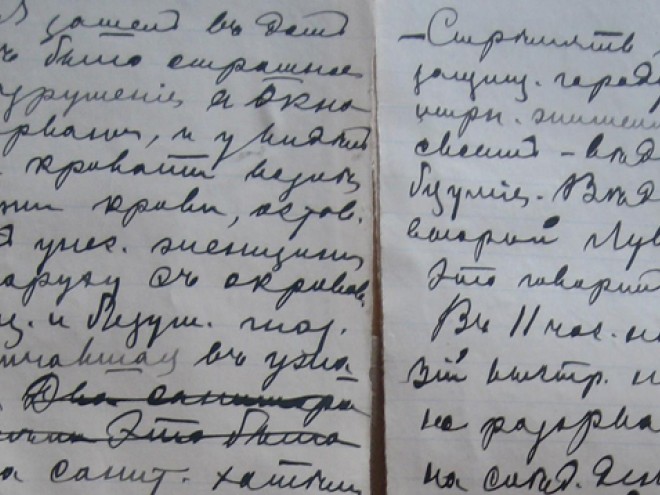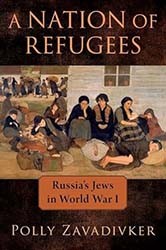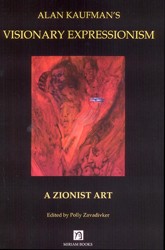Earlier this week, Polly Zavadivker wrote about S. Ansky, Isaac Babel, and Vasily Grossman’s chronicles of the catastrophe of the Russian twentieth century. She is blogging here all week as part of the Visiting Scribe series on The ProsenPeople.
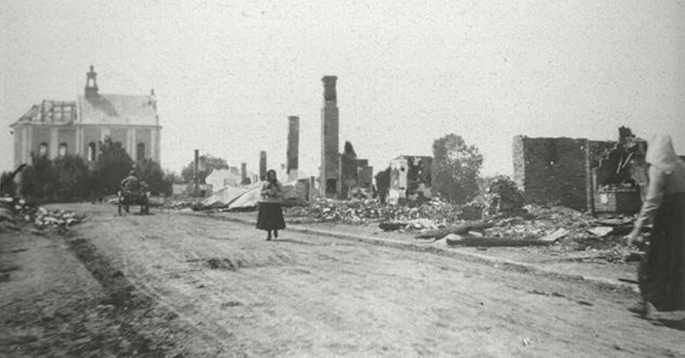 Gussakov, Galicia, during World War I. Photograph taken by Bernard Bardach. Leo Baeck Institute, New York
Gussakov, Galicia, during World War I. Photograph taken by Bernard Bardach. Leo Baeck Institute, New York
My husband likes to say that I specialize in rubble. He is only half-joking.
I study the history of Jews in Russia and the USSR during the First and Second World Wars. Over the years, I have encountered many texts written by eyewitnesses that stood out to me for their historical insights, literary styles, and the compelling personalities that animate them. Originally written in Yiddish and Russian, the majority of them have unfortunately not been translated into English. Among those that are available in English, here is a brazenly biased list of five of my favorites:
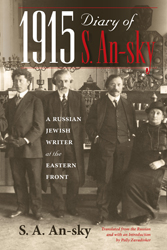 1. The 1915 Diary of S. An-sky: A Russian Jewish Writer at the Eastern Front: I found this diary so compelling that I translated it in order to share with others. Approximately five months’ worth of diary entries, written from January to March and September to October, 1915, are what remain of the diaries that S. An-sky kept during World War I. They later became the basis for a 600-page Yiddish memoir that he completed in 1920, Khurbn Galitsye (The Destruction of Galicia). In simple, stark words, he recounts wartime experiences in the capital cities of Moscow, Petrograd, and Kiev; his travels across Russian-occupied Galicia as an aid worker among Jewish civilians; his encounters with Russian and Cossack troops on trains; and his close encounters with death and destruction. To my knowledge, this is the only eyewitness account available in English by a Jewish writer on the Russian side of the Eastern Front lines of World War I.
1. The 1915 Diary of S. An-sky: A Russian Jewish Writer at the Eastern Front: I found this diary so compelling that I translated it in order to share with others. Approximately five months’ worth of diary entries, written from January to March and September to October, 1915, are what remain of the diaries that S. An-sky kept during World War I. They later became the basis for a 600-page Yiddish memoir that he completed in 1920, Khurbn Galitsye (The Destruction of Galicia). In simple, stark words, he recounts wartime experiences in the capital cities of Moscow, Petrograd, and Kiev; his travels across Russian-occupied Galicia as an aid worker among Jewish civilians; his encounters with Russian and Cossack troops on trains; and his close encounters with death and destruction. To my knowledge, this is the only eyewitness account available in English by a Jewish writer on the Russian side of the Eastern Front lines of World War I.
2. Isaac Babel’s 1920 Diary: Babel, a Jewish literary genius born and raised in Odessa, recorded his experiences as a bespectacled Jewish Communist traveling with a Red Army detachment during the Polish-Bolshevik War in summer 1920. A secular Jew who intended to make a place for himself in the new Soviet order, he was nonetheless deeply troubled by the prospect of what that new order had in store for the Jews. His diary provides evidence of his emotional reactions to encounters with Hasidic rebbes, centuries-old synagogues, and violent Red Army troops. The diary remained a hidden source for Babel’s famous Red Cavalry story cycle for nearly seventy years, and resurfaced in the 1990s, with multiple printings in Russian, German and an excellent translation into English by Carol Avins.
3. The Literature of Destruction: Jewish Responses to Catastrophe, edited by David Roskies: This is an indispensable tome of literary sources written by East European Jews from the First to the Second World War. Roskies culled translations from Yiddish, Russian, Polish, and Hebrew texts from a variety of genres, including poetry, memoirs, diaries and journalism. 
4. The Road: Stories, Journalism and Essays by Vasily Grossman: This collection includes three deeply moving texts that are essential to understanding the lesser known aspects of the Holocaust: Grossman’s essay about the death camp at Treblinka, whose liberation he witnessed as a journalist traveling with the Red Army in 1944; his 1943 short story “The Old Teacher,” about the mass shooting of Jews in an unnamed village in Ukraine; two brief but powerful letters that Grossman wrote to his mother in 1950 and 1961 on the anniversary of her death in the city of Berdichev, where she was killed by Germans in a mass shooting in September 1941.
5. Regrowth: Seven Tales of Jewish Life Before, During, and After Nazi Occupation: Beautifully crafted Yiddish short stories by Der Nister, or “The Hidden One,” pseudonym of the Soviet Yiddish writer Pinhas Kaganovich. A native son of Berdichev, like Vasily Grossman, Der Nister’s stories describe the destruction of Jewish families and communities under Nazi occupation of Soviet territory. His psychological insights and imagery convey the depth of damage done to the inner lives of victims and those left in the aftermath.
Polly Zavadivker is Assistant Professor of History and Jewish Studies at the University of Delaware. She is the editor and translator of the recently published 1915 Diary of S. An-sky: A Russian Jewish Writer at the Eastern Front.
Related Content:
Polly Zavadivker is Assistant Professor of History and Jewish Studies at the University of Delaware. She is the editor and translator of the recently published The 1915 Diary of S. An-sky: A Russian Jewish Writer at the Eastern Front (Indiana University Press). Her work has been published in journals including East European Jewish Affairs, The Simon Dubnow Institute Yearbook, Russian Review, and others. She is currently at work on a manuscript entitled “Blood and Ink: Jewish Chroniclers of Catastrophe in Twentieth Century Russia.”
On Writing Catastrophe: Jewish Chroniclers of War in Twentieth-Century Russia
Jews in the Rubble: A Reading List of Soviet Jewish Eyewitness Accounts of World War I
